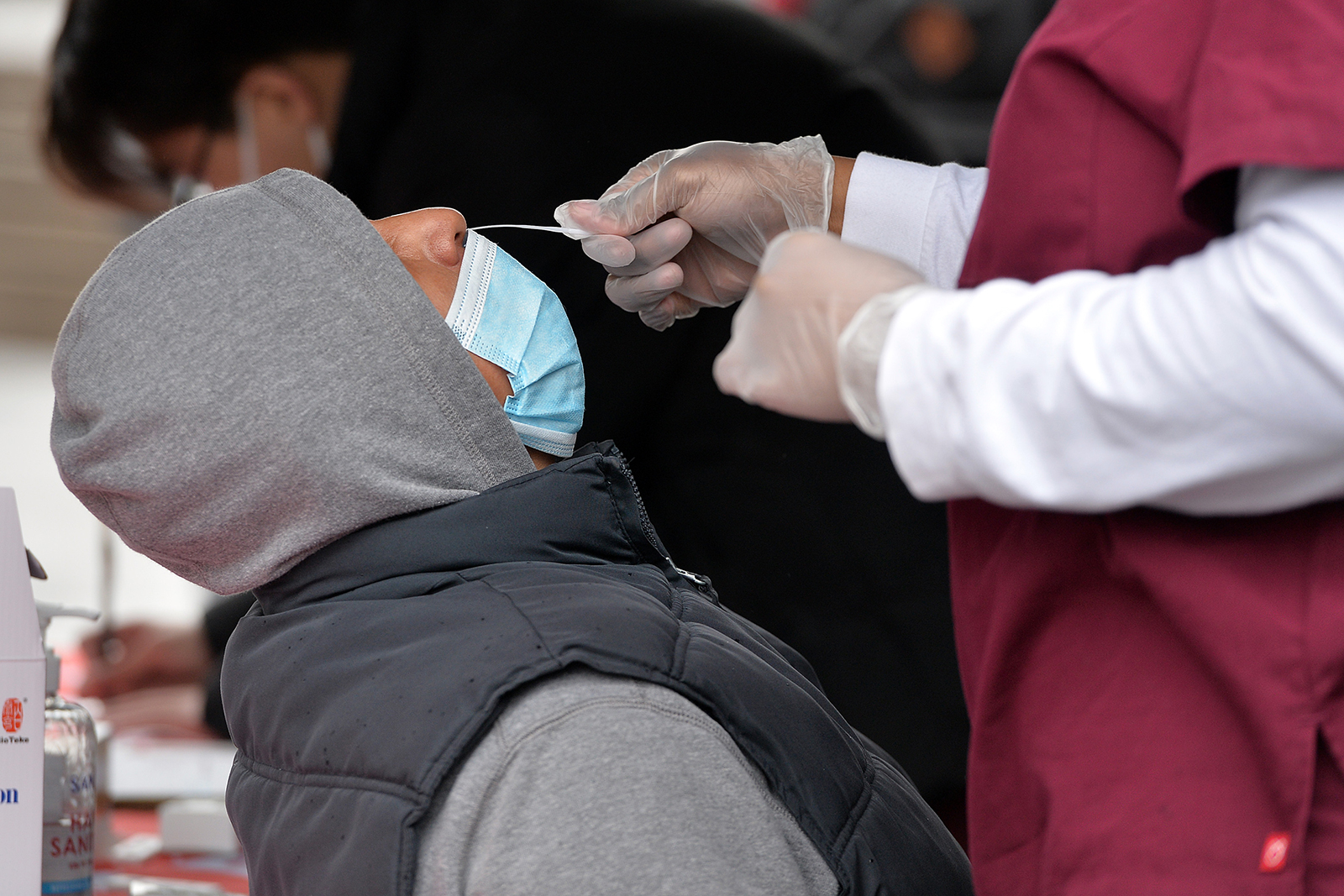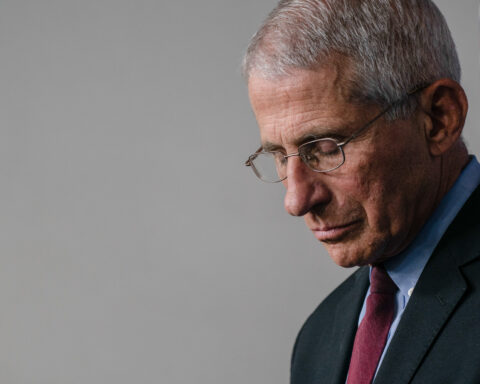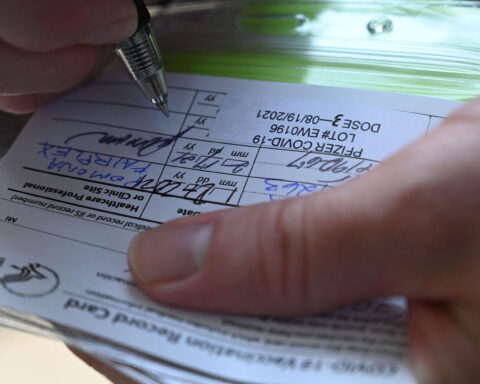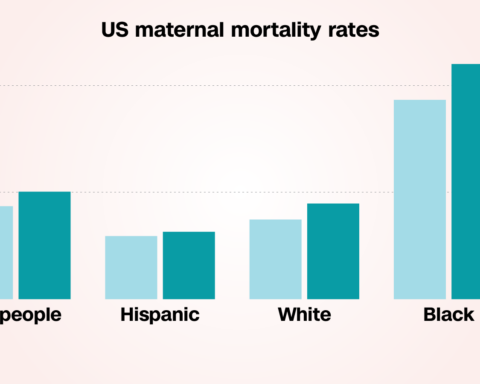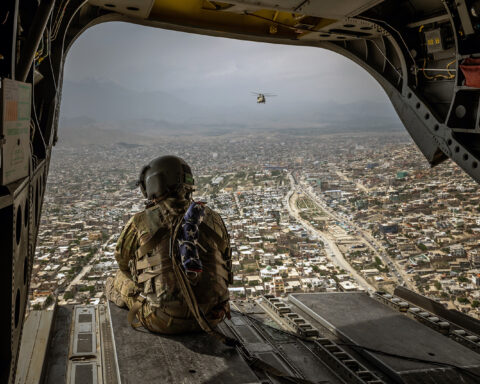US officials are racing to vaccinate as many Americans as possible to beat another Covid-19 surge — and doses are being administered at a record pace.
But that’s not all the US needs to be doing right now.
“Don’t declare victory prematurely,” Dr. Anthony Fauci, the nation’s top infectious disease expert, said on CNN Monday night. “We see so many pulling back on some of the public health measures, the mask mandates, the restaurant opening, the bars, we can’t be doing that. We’ve got to wait a bit longer until we get enough vaccine into people that we will clearly blunt any surge.”
And with a combination of the fast vaccinations and a doubling down on safety measures, the US could soon see a “turnaround,” Fauci said, and cases could start to come down again.
But for now, reported Covid-19 infections and hospitalizations are on the rise, fueled by the B.1.1.7 variant. The increases are predominantly in younger Americans, most of whom have not yet been vaccinated, leading health officials have said.
The dangerous strain, which experts say is more infectious, as well as other variants, is why it’s important to stay vigilant, experts have said, until vaccination numbers climb enough to control the spread of the virus.
“That’s the reason why we say vaccinate, but don’t just decide we’re victorious,” Fauci said. “Because we’re not victorious yet.”
Coronavirus variants are behind alarming trends in several states, including Michigan, which local officials say is in the middle of another surge, with both case and hospitalization numbers quickly rising. The state has the second-highest number of cases of the B.1.1.7 variant, according to data from the Centers for Disease Control and Prevention. The state with the highest number of cases of the variant is Florida.
In New Jersey, where there are more than 950 cases reported of concerning variants, patients on ventilators and virus-related deaths have increased, state health commissioner Judy Persichilli said Monday. About 48% of the state’s new hospitalizations were people under the age of 60, Persichilli added.
US is on track to hit an important vaccination milestone
The good news is that vaccination numbers are climbing rapidly.
More than 120 million Americans — about 36.4% of the population — have received at least one dose of a Covid-19 vaccine, according to CDC data. Meanwhile, more than 74 million people — about 22.3% of the US population — have been fully vaccinated.
Among US adults, roughly 46.5% have so far received at least one dose of a vaccine — and the US is on track to reach half of the US adult population with at least one dose by the end of the week, according to a CNN analysis of CDC data.
At least 11 states have already reached that threshold. They are Connecticut, Maine, Massachusetts, Minnesota, New Hampshire, New Jersey, New Mexico, Rhode Island, South Dakota, Vermont and Wisconsin.
In Kentucky, Gov. Andy Beshear announced a new “Team Kentucky Vaccination Challenge,” saying that when 2.5 million residents have received at least their first dose of a Covid-19 vaccine, the state will remove most of its capacity restrictions.
“With the vaccine supply we have, we could get there in as little as three-and-a-half weeks from now,” Beshear said in a news release. “That minimum time frame might not be realistic, but we should get there in four to six weeks if we are intentional.”
More than 1.6 million residents have so far received at least their first dose of vaccine, the release said.
“We have to try everything to reach this point as quickly as possible. That will help us have a more normal summer than any of us could have imagined this winter,” the governor added.
What Fauci says about indoor and outdoor dining
Fauci, who has been fully vaccinated, was asked by CNN’s Wolf Blitzer whether he would consider outdoor dining.
Fauci said that while he’s been too busy to do so recently, “in an outdoor restaurant, right now, where we are, I would not hesitate to do that.”
And what about indoor dining for Americans who are fully vaccinated?
“What you need to do is you need to look at the level of infection in the community,” Fauci said. “And again, being vaccinated, the risk for you is very low. It isn’t like before, when you were not vaccinated and you had a lot of activity in the community and you went into an indoor restaurant where there was no (restrictions)… your risk would be up there. Whereas now, the risk is not zero, but it’s extremely low.”
People will have to make the determination on what level of risk they are willing to take, Fauci added.
“If someone is very risk-averse they’ll say ‘no, no I want to wait until the level of infection is way, way, way down in the community.’ Whereas others might be a little bit different,” Fauci said. “But, the point that can’t be lost in the discussion is that being vaccinated, fully vaccinated, you diminish dramatically the risk.”
More universities will require vaccine proof
To lower Covid-19 risks on their campuses, a growing number of colleges and universities have announced they will require all students to be fully vaccinated against Covid-19 before returning to campus.
Johns Hopkins University, in Maryland, is the latest to join the list.
All students who plan to be on campus will be required to be vaccinated unless they have a medical or religious reason not to be and faculty are also strongly recommended to be vaccinated, although it will not be required for them, according to an announcement sent to the campus community on Friday.
“Our plans are predicated on continuing public health strategies to promote a safe campus and community,” Johns Hopkins University President Ronald Daniels and other university leaders wrote.
“Ensuring that the overwhelming percentage of our community’s population is vaccinated will greatly reduce the risk of the virus’s spread on our campuses and will also protect our neighbors in Baltimore,” they added.
By CNN’s count, there are at least 18 colleges and universities in the US that will be requiring Covid-19 vaccines.

